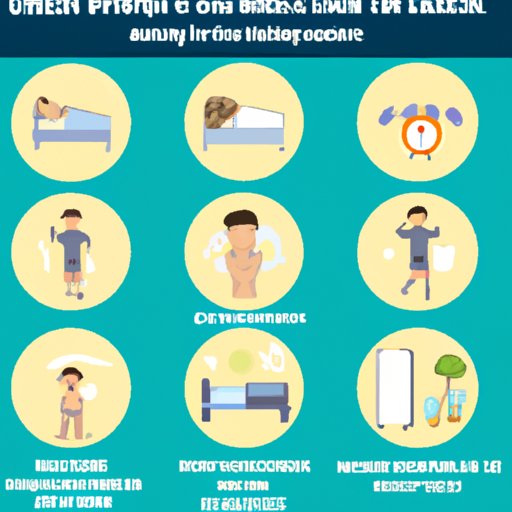Introduction
Sleep is essential for good health and well-being. According to the National Sleep Foundation, adults between 18 and 64 should get seven to nine hours of sleep each night. Unfortunately, many people struggle with getting enough restful sleep. In fact, the Centers for Disease Control and Prevention (CDC) estimates that one in three American adults do not get enough sleep.
In this article, we will explore what is the best way to sleep and discuss practical tips for a good night’s rest.
Creating a Sleep Routine
One of the most important steps in achieving a good night’s sleep is to establish a regular bedtime and wake-up time. It’s also important to stick to the same schedule even on weekends and days off. This helps to regulate your body’s circadian rhythm so that you feel sleepy at the same time every night.
It’s also important to turn off electronics at least one hour before going to bed. The blue light emitted from devices such as smartphones and tablets can interfere with your body’s production of melatonin, which helps you to sleep.
Setting an Ideal Sleeping Environment
The temperature of your bedroom can also affect your ability to sleep. According to the National Sleep Foundation, the ideal temperature for sleep is between 60 and 67 degrees Fahrenheit. Make sure to adjust your thermostat accordingly.
You should also reduce light and noise levels in your bedroom. Invest in blackout curtains or an eye mask to keep out as much light as possible. You may also want to use a white noise machine or earplugs to block out any distracting sounds.
Finally, it’s important to invest in quality pillows and mattress. A comfortable mattress and supportive pillow can make all the difference in getting a good night’s sleep.
Practicing Relaxation Techniques
Relaxation techniques can help to reduce stress and anxiety and make it easier to fall asleep. One technique is meditation, which involves focusing on your breath and letting go of any worries or thoughts. Progressive muscle relaxation consists of tensing and relaxing muscles one by one. Deep breathing is another helpful technique that involves inhaling deeply through the nose and exhaling slowly through the mouth.
Exercising During the Day
Exercise can help you to sleep better at night. Exercise increases the amount of time spent in deep sleep, which is the most restorative stage of sleep. It can also help to reduce stress levels and improve overall physical health.
Any type of exercise can be beneficial, but strength training and aerobic activities such as running, biking and swimming are particularly effective. Aim to get at least 30 minutes of exercise per day. If you have a busy schedule, try breaking up your workout into shorter 10-minute intervals.
Eating Healthy Foods
There are certain foods that can help promote better sleep. Avoid caffeine, alcohol and sugar in the late afternoon and evening. These substances can disrupt your sleep cycle and make it harder to fall asleep.
Eating high-protein foods such as eggs, nuts and legumes can help to boost your energy levels throughout the day and improve your sleep at night. Eating nutrient-dense foods such as fruits, vegetables and whole grains can also support healthy sleep patterns.
Using Natural Sleep Aids
If you’re still having trouble sleeping, there are several natural remedies that can be used to help. Herbal remedies such as chamomile, lavender and valerian root can help to relax the body and encourage sleep. Aromatherapy using essential oils such as lavender and ylang-ylang can also be beneficial. Finally, sound machines or apps can be used to create soothing sounds such as ocean waves or rainforest noises.
Conclusion
Getting a good night’s sleep is essential for good health and well-being. To achieve better sleep, it’s important to establish a regular sleep routine, set an ideal sleeping environment, practice relaxation techniques, exercise during the day and eat healthy foods. If needed, natural sleep aids such as herbal remedies, aromatherapy and sound machines can also be used. With these tips, you can enjoy more restful sleep and improved quality of life.
Summary of Tips
To achieve better sleep: establish a regular sleep routine; set an ideal sleeping environment; practice relaxation techniques; exercise during the day; eat healthy foods; and use natural sleep aids if needed.
Final Thoughts
Sleep is essential for good health and well-being. Follow the tips outlined in this article to get the restful sleep you need.
(Note: Is this article not meeting your expectations? Do you have knowledge or insights to share? Unlock new opportunities and expand your reach by joining our authors team. Click Registration to join us and share your expertise with our readers.)
